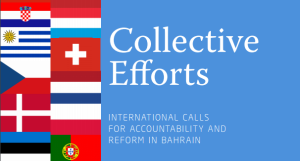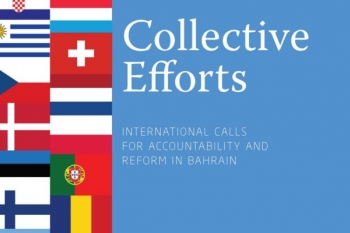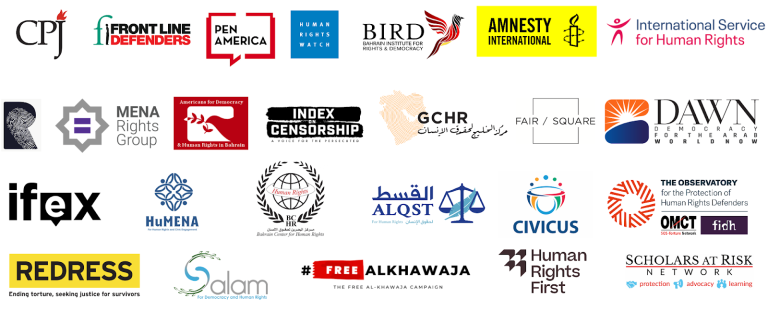 14 September 2016 – In 2011, the Government of Bahrain violently suppressed the country’s peaceful pro-democracy movement. More than half of the population protested structural inequalities, corruption, repression, and a lack of democratic political representation. In response to the protest movement, the Bahraini government dispatched security forces to quell the demonstrations, leading to thousands of arrests, hundreds of injuries, and dozens of deaths. From athletes to lawyers, and students to nurses, the government targeted anyone who raised a dissenting voice with media attacks, home raids, arbitrary detention, judicial harassment, torture, and even extrajudicial killing.
14 September 2016 – In 2011, the Government of Bahrain violently suppressed the country’s peaceful pro-democracy movement. More than half of the population protested structural inequalities, corruption, repression, and a lack of democratic political representation. In response to the protest movement, the Bahraini government dispatched security forces to quell the demonstrations, leading to thousands of arrests, hundreds of injuries, and dozens of deaths. From athletes to lawyers, and students to nurses, the government targeted anyone who raised a dissenting voice with media attacks, home raids, arbitrary detention, judicial harassment, torture, and even extrajudicial killing.
Over the last five years, the government has only intensified its control of civil society by interrogating, arresting, and imprisoning hundreds of human rights defenders, journalists, political opposition leaders, and religious figures. In just the first eight months of 2016, Bahraini authorities have targeted prominent activists like Nabeel Rajab and Sheikh Maytham al-Salman and initiated an unprecedented campaign to restrict the rights of the country’s Shia religious leadership. In response to the increased suppression of religious freedom, in particular, five UN Special Procedures recently released a joint statement urging Bahrain to end its “persecution of Shias,” who continue to be “targeted on the basis of their religion.”
It is against this backdrop that the international community has issued numerous statements expressing concern for ongoing human rights violations Bahrain and calling for reform. In this report, Collective Efforts: International Calls for Accountability and Reform in Bahrain, Americans for Democracy & Human Rights in Bahrain (ADHRB), the Bahrain Center for Human Rights (BCHR), and the Bahrain Institute for Right & Democracy (BIRD) analyze all the statements and resolutions of the member states of the United Nations Human Rights Council (HRC), the European Parliament (EP), the Office of the High Commissioner of Human Rights (OHCHR), and the UN Secretary-General since 2011 in order to track the international reaction to the deterioration of Bahrain’s human rights situation.
Specifically, this report examines the five joint statements on Bahrain issued by the UN Human Rights Council, the eight resolutions on Bahrain passed by the European Parliament, and all statements and press releases issued by the UN Secretary-General, the UN High Commissioner for Human Rights, and the UN Special Procedures since 2011. ADHRB, BCHR, and BIRD have found that despite numerous calls from these widely respected institutions and leaders, the Government of Bahrain has largely continued to violate basic human rights including those to free expression, assembly, and association. In 2016 alone, the authorities have: arrested and forcibly exiled activist Zainab al-Khawaja; rearrested human rights defender and BCHR president Nabeel Rajab; dissolved the largest political opposition group, Al-Wefaq National Islamic Society; extended the sentence of Al-Wefaq’s secretary-general, Sheikh Ali Salman; issued multiple travel bans against human rights defenders and activists; and, denaturalized Ayatollah Sheikh Isa Qassim, who is widely regarded as the spiritual leader of Bahrain’s Shia community. As one Bahraini activist recently described these developments to ADHRB, “[in the] last few weeks, civil society came under direct and open assaults by authorities and the government became bolder than ever in targeting religious leaders, human rights defenders and civil society organizations that expose corruption, highlight human rights violations, and demand democratic reforms.”
By providing a brief overview of the international community’s past engagement on Bahrain, this report also provides a clear picture of what new action the international community must take to improve the country’s human rights situation. Though the statements and resolutions described here represent significant international efforts to drive positive change in Bahrain, ADHRB, BIRD, and BCHR find that the current approach is no longer appropriate for the scale of ongoing human rights violations. To effectively pressure the government to reconsider its intensified assault on civil society and the public freedoms, it is time for the HRC to issue a resolution on Bahrain. A resolution will best reflect the increasing seriousness of the situation and send a clear message to the Government of Bahrain that the international community will not tolerate the continued violation of basic human rights.





